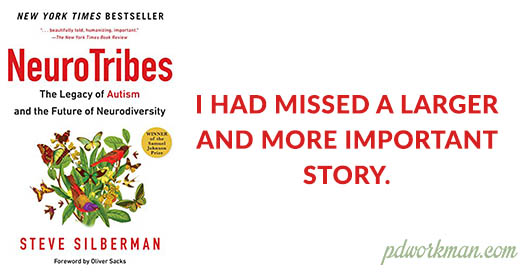I have a special deal on Gluten-Free Murder this Thursday, be sure to check back and grab it, if you haven’t already.
Teaser Tuesdays is a weekly bookish meme. Read the rules and more teasers at The Purple Booker. Anyone can play along.
Neurotribes: The Legacy of Autism and the Future of Neurodiversity by Steve Silberman has been on my “to read” list for a while now, and I wish I had picked it up sooner. Silberman delves into the history of the recognition of autism, its diagnosis and treatment, and the neurodiversity movement. He is a great storyteller and has a genuine interest in the children, families, and adults he learned about autism from. Autism has been an interest of mine for many years, and while I knew the general history of its diagnosis and treatment, Silberman managed to add a lot of details I was not familiar with and really brought the subject matter alive. If this is an area that interests you at all, pick it up!
Years passed, and I still got e-mail about “The Geek Syndrome” nearly every week. As time went on, though, I became convinced that by focusing on the dynamics of autism in one highly specialized community, I had missed a larger and more important story.
NeuroTribes: The Legacy of Autism and the Future of Neurodiversity, Steve Silberman
What is autism? A lifelong disability, or a naturally occurring form of cognitive difference akin to certain forms of genius? In truth, it is all of these things and more—and the future of our society depends on our understanding it. WIRED reporter Steve Silberman unearths the secret history of autism, long suppressed by the same clinicians who became famous for discovering it, and finds surprising answers to the crucial question of why the number of diagnoses has soared in recent years.
Going back to the earliest days of autism research and chronicling the brave and lonely journey of autistic people and their families through the decades, Silberman provides long-sought solutions to the autism puzzle, while mapping out a path for our society toward a more humane world in which people with learning differences and those who love them have access to the resources they need to live happier, healthier, more secure, and more meaningful lives.
Along the way, he reveals the untold story of Hans Asperger, the father of Asperger’s syndrome, whose “little professors” were targeted by the darkest social-engineering experiment in human history; exposes the covert campaign by child psychiatrist Leo Kanner to suppress knowledge of the autism spectrum for fifty years; and casts light on the growing movement of “neurodiversity” activists seeking respect, support, technological innovation, accommodations in the workplace and in education, and the right to self-determination for those with cognitive differences.



